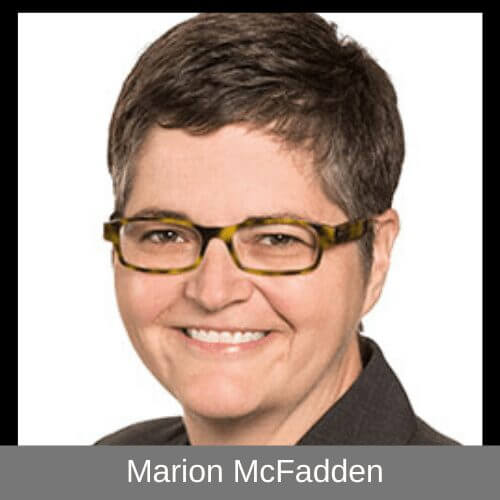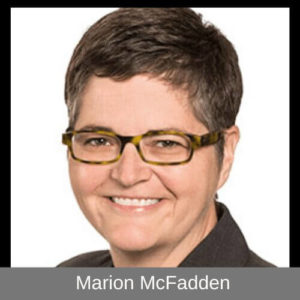
Ep. 29 - Marion McFadden, has candid advice on the priorities and political will Washington should have. While Congress has yet to provide funding needed to take people off long waiting lists for assistance, there is hope to be found in the private sector and state and local governments who are making major commitments to prioritizing affordable housing and in the power of advocacy.
Top Takeaways:
-
- The lessons that we should have learned as a country in disaster recovery
- The importance of emphasizing on the cost of construction when rebuilding houses for disaster victims
- How to be flexible in working with different teams and fields
- Why the role of HUD should be preserved and increased through political will
- The possibility of making tax credit easier for certain vulnerable communities
- The importance of housing people first before working on their more layered complexities
Listen in to hear how the disaster recovery fund has changed over the years and what needs to be done to ensure the mistakes of the past are not repeated.
"Figure out what you can do from where you are and keep up the political pressure, use social media and get folks your own age or any other age involved because we need to keep this issue front and center."
CAREER
At the Department of Housing and Urban Development (HUD), she served as Deputy Assistant Secretary for Grant Programs at the U.S. Department of Housing and Urban Housing (HUD). At HUD, she oversaw affordable housing and community development programs, including the Community Development Block Grant Program (CDBG), the HOME Investment Partnerships program, the Housing Trust Fund, the Neighborhood Stabilization Program (NSP) and CDBG Disaster Recovery funds, including the recent National Disaster Resilience Competition grants.
In this role she formed and facilitated multiple public-private partnerships, including with the Rockefeller Foundation to support communities planning for disaster resilience, with the Silicon Valley-based company GitHub to bring tech education and resources to residents of public housing, and with the nonprofit organization KaBOOM! to create a design competition to retrofit cities and other built spaces to accommodate play for better health of residents.
After 15 years at HUD, Marion Mollegen McFadden felt she could make a bigger impact outside of the government. Marion Mollegen McFadden serves as senior vice president for public policy and as senior advisor for resilience at Enterprise. She leads Enterprise's policy development and research and advocacy at the federal, state, and local levels, where we work with thousands of partners to safeguard, expand, analyze and improve programs that support equitable housing affordability and neighborhoods of opportunity. Marion works nationwide to support resilience planning and programs in communities impacted by flooding, hurricanes, earthquakes, wildfires, and extreme heat so that they can build more resilient futures.
EDUCATION
Marion holds a J.D., magna cum laude, from Howard University School of Law and a bachelor's from Northwestern University.
HONORS
Marion has been invited to testify in front of Congress five times. She has been widely featured in national media outlets including the NY Times, the Washington Post, the Wall Street Journal, Fortune, Bloomberg, PBS Frontline, National Public Radio, and the Hill.
Listen to learn why people need housing first before they can deal with other layered complexities. Tune in for her sage advice on what the future of housing should hold.
Key Moments
She explains who Enterprise Community Partners are and how long they have been in service [2:41]
How they work to provide solutions across the field through policy [3:26]
She describes her experience working at HUD and what her role was [4:15]
How the disaster recovery funds have changed between now and 9/11 [4:55]
How they are approaching housing amid Coronavirus pandemic [6:15]
The disaster recovery lessons that we did not learn as a country through past disasters [7:06]
She explains her biggest success story as to how she handled rebuilding homes for hurricane Sandy's victims [8:43]
She reveals her regrets over how they handled the housing compensation for hurricane Katrina's victims which still haunts her to date [10:12]
What she would do differently in taking care of disaster victims' housing [12:10]
Why she believes that her flexibility while working with HUD is her legacy [14:11]
She explains the role of HUD which is to serve the most vulnerable people in society [15:48]
Why Congress' lack of faith in HUD is its biggest challenge right now [16:50]
The supply and demand in the affordable housing and the importance of expansion of the authorities available [18:05]
She explains the complexity of layering and how it affects affordable housing [19:13]
How the home program works for community needs in the rental or homeownership needs [20:02]
How they have been working to make the tax credit program easier to use for certain communities [21:51]
Should affordable housing be an entitlement program [23:55]
Why the affordable housing subject has become important [25:40]
What is the housing first movement and its importance [27:44]
Why she believes that Congress will put money into affordable housing to help needy communities [28:51]
What advice would she give to young people who want to advocate for affordable housing [29:45]
RESOURCES
Enterprise Community
Senior VP Role
LinkedIn Marion McFadden
News Release Marion McFadden
Marion McFadden Testifies on Disaster Recovery
Marion McFadden on the CARES Act
Investments to Protect Existing Residents

